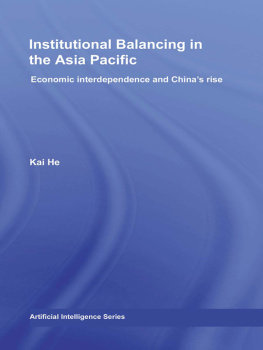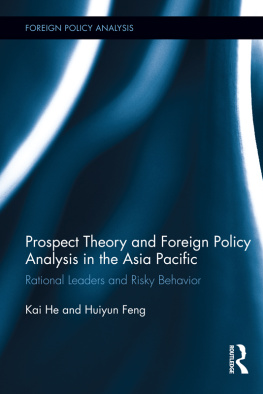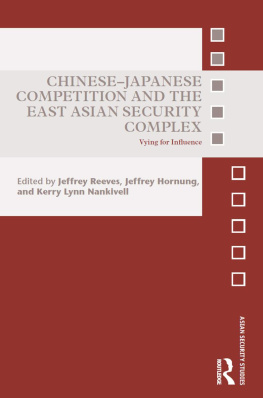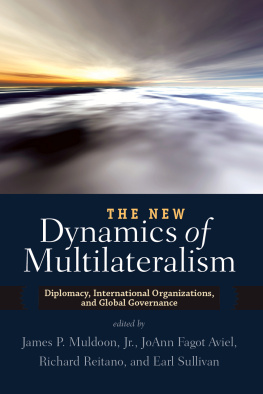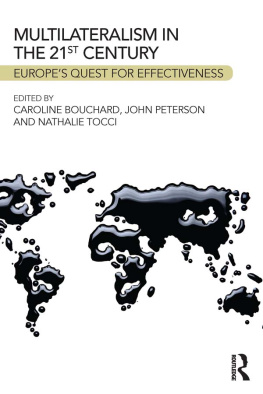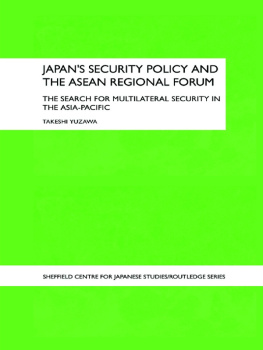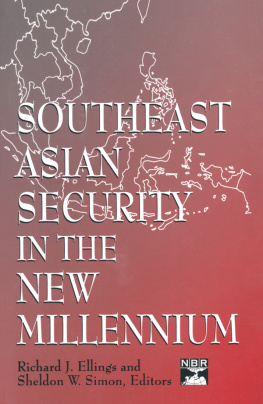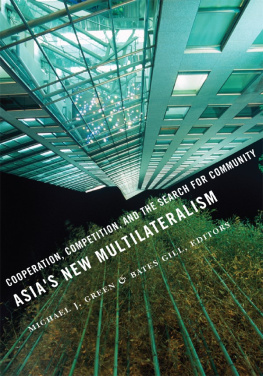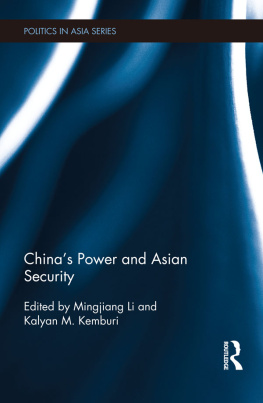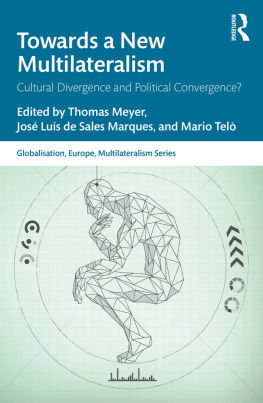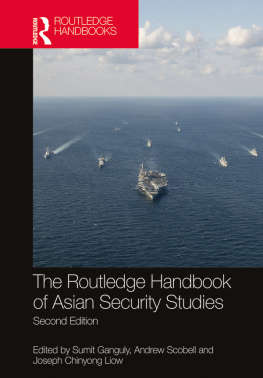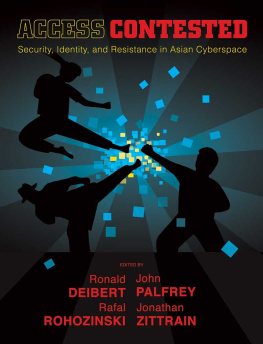Assembling a team of leading scholars, Kai He and his colleagues have convincingly argued that contested multilateralism 2.0 is the key to understanding the new security dynamics in Asia. A must read for all students who care about the future of Asia and multilateralism.
Shiping Tang, distinguished professor, Fudan University and author of The Social Evolution of International Politics
Regional and international institutions in East Asia have been changing their roles, functions and geographical scope along with radical power shifts in East Asian politics. Institutions have become more important tools for national foreign policies and for creating a new regional and international order. Professor Hes new edited book contributes to our understanding of this new phenomenon both theoretically and empirically, by putting together different theoretical perspectives and national policy orientations of the major countries in the region. I recommend this book to both researchers and policy practitioners who are interested in, and deal with, this important region.
Yoshinobu Yamamoto, Professor Emeritus, University of Tokyo, Japan
Contested Multilateralism 2.0 and Asian Security Dynamics
In the 1990s there was a wave of multilateralism in the Asia Pacific, led primarily by ASEAN. Since the Global Financial Crisis of 2008, however, many non-ASEAN states have attempted to seize the initiative, including the USA, Japan, China, South Korea, and Australia.
Kai He and his contributors debate the reasons for this contested multilateralism and the impacts it will have on the regions security and political challenges. Will the Indo-Pacific turn be a blessing or a curse for regional stability and prosperity? Using a diverse range of theoretical and empirical perspectives, these leading scholars contribute views on this question and on the diverse strategies of the great and middle powers in the region.
This collection will be of great interest to scholars and students of international relations in the Asia Pacific and of great value to policy makers in the region and beyond.
Kai He is a Professor of International Relations in the Griffith Asia Institute and Centre for Governance and Public Policy at Griffith University in Brisbane, Australia. He is currently an Australian Research Council Future Fellow (20172020) and a Visiting Chair Professor of International Relations at Nankai University, China (20182021).
ROUTLEDGE ADVANCES IN INTERNATIONAL RELATIONS AND GLOBAL POLITICS
International Relations as Politics Among People
Hannes Hansen-Magnusson
Mexicos Drug War and Criminal Networks
The Dark Side of Social Media
Nilda M. Garcia
Transnational Labour Migration, Livelihoods and Agrarian Change in Nepal
The Remittance Village
Ramesh Sunam
A Middle East Free of Weapons of Mass Destruction
A New Approach to Nonproliferation
Seyed Hossein Mousavian and Emad Kiyaei
Weak States as Spheres of Great Power Competition
Hanna Samir Kassab
Contested Multilateralism 2.0 and Asian Security Dynamics
Kai He
For information about the series: https://www.routledge.com/Routledge-Advances-in-International-Relations-and-Global-Politics/book-series/IRGP
First published 2020
by Routledge
2 Park Square, Milton Park, Abingdon, Oxon OX14 4RN
and by Routledge
52 Vanderbilt Avenue, New York, NY 10017
Routledge is an imprint of the Taylor & Francis Group, an informa business
2020 selection and editorial matter, Kai He; individual chapters, the contributors
The right of Kai He to be identified as the author of the editorial material, and of the authors for their individual chapters, has been asserted in accordance with sections 77 and 78 of the Copyright, Designs and Patents Act 1988.
All rights reserved. No part of this book may be reprinted or reproduced or utilized in any form or by any electronic, mechanical, or other means, now known or hereafter invented, including photocopying and recording, or in any information storage or retrieval system, without permission in writing from the publishers.
Trademark notice: Product or corporate names may be trademarks or registered trademarks, and are used only for identification and explanation without intent to infringe.
British Library Cataloguing-in-Publication Data
A catalogue record for this book is available from the British Library
Library of Congress Cataloging-in-Publication Data
Names: He, Kai, 1973- editor.
Title: Contested multilateralism 2.0 and Asian security dynamics / edited by Kai He.
Description: Abingdon, Oxon ; New York, NY : Routledge, 2020. |
Includes bibliographical references and index.
Identifiers: LCCN 2019058819 (print) | LCCN 2019058820 (ebook) |
ISBN 9780367893378 (hardback) | ISBN 9780367893385 (paperback) | ISBN 9781003018650 (ebook)
Subjects: LCSH: Asian cooperation. | Regionalism--Asia. | Asia--Foreign relations.
Classification: LCC JZ5333 .C665 2020 (print) | LCC JZ5333 (ebook) | DDC 355/.03305--dc23
LC record available at https://lccn.loc.gov/2019058819
LC ebook record available at https://lccn.loc.gov/2019058820
ISBN: 978-0-367-89337-8 (hbk)
ISBN: 978-0-367-89338-5 (pbk)
ISBN: 978-1-003-01865-0 (ebk)
Since the 2008 global financial crisis (GFC), the strategic competition between the United States and China has occupied the media headlines on world politics. Scholars and pundits are fascinated by the question of whether the United States and China will fall into the Thucydides Trap, in which a ruling power will tragically fight against a rising power in order to overcome the fear generated by the power transition in the international system. One intriguing, but largely omitted, phenomenon is that the USChina strategic rivalry and competition is quite different from what the United States and the Soviet Union experienced during the Cold War. While there has been a prolonged trade war between the United States and China since President Donald Trump came to power in 2016, a trade war is much better than a Cold War. We cannot rule out the possibility that a new Cold War between the United States and China may take place. Nevertheless, it is clear that the international order transition accompanying USChina strategic competition will be different from previous power transitions in history.
Multilateralism is one of the factors that will contribute to a different international order transition in the 21st century. This is why we have witnessed the emergence of contested multilateralism 2.0 in the Asia Pacific since the 2008 GFC, in which all major players in the region, including the United States, China, Japan, Australia, South Korea, and ASEAN, have actively engaged in multilateralism to differing degrees. Although withdrawing from the Trans-Pacific Partnership, Trump emphasized the rules-based order in the Indo Pacific by reviving the Quadrilateral Security Dialogue (the so-called Quad 2.0) with Japan, Australia, and India in 2017. The United States will continue its leadership contestation with China in the region through a variety of existing regional instrumentalities and institutions.
Will multilateralism 2.0 still matter for regional security and international order transition? If so, how? In particular, how will regional actors employ differing institutional strategies to maximize their respective national interests during the period of international order transition? Several of the leading international relations (IR) scholars on multilateralism and Asian security offer new perspectives in this edited volume and shed some light on these questions regarding multilateralism and the future regional order transition against a background of USChina strategic competition in the 21st century. This book is supported by the Australian Research Council [grant number FT160100355] and a policy-oriented research grant from the Korea Foundation, which have made this publication possible.


